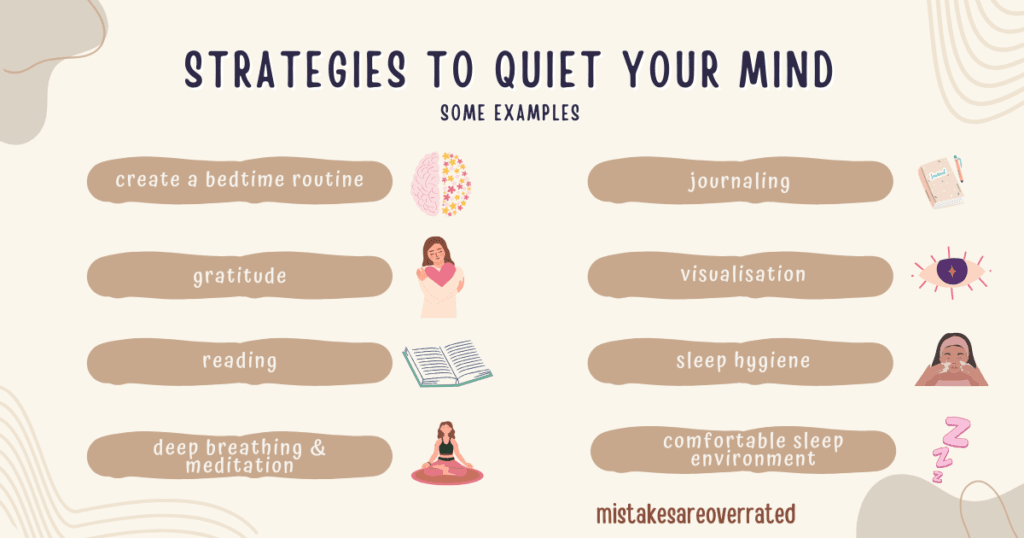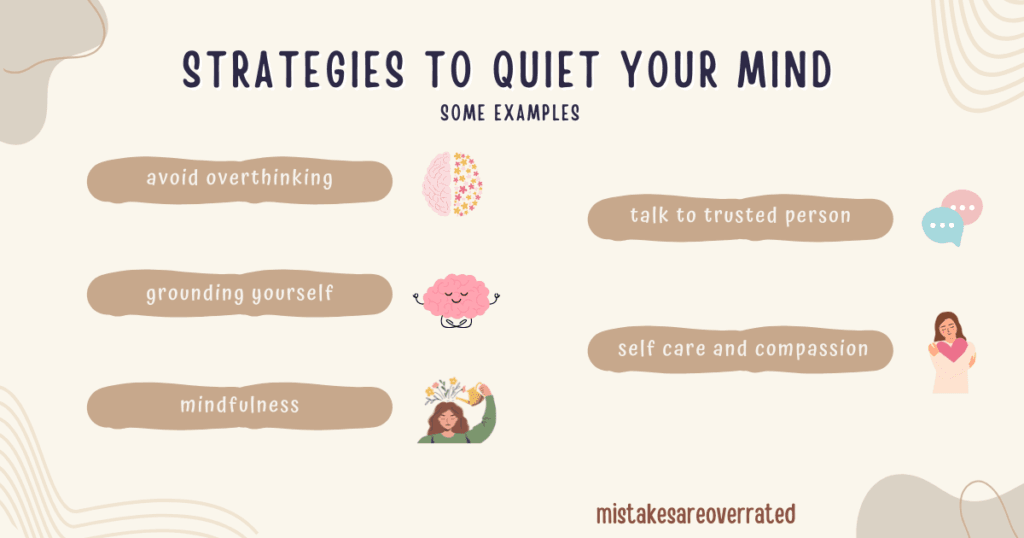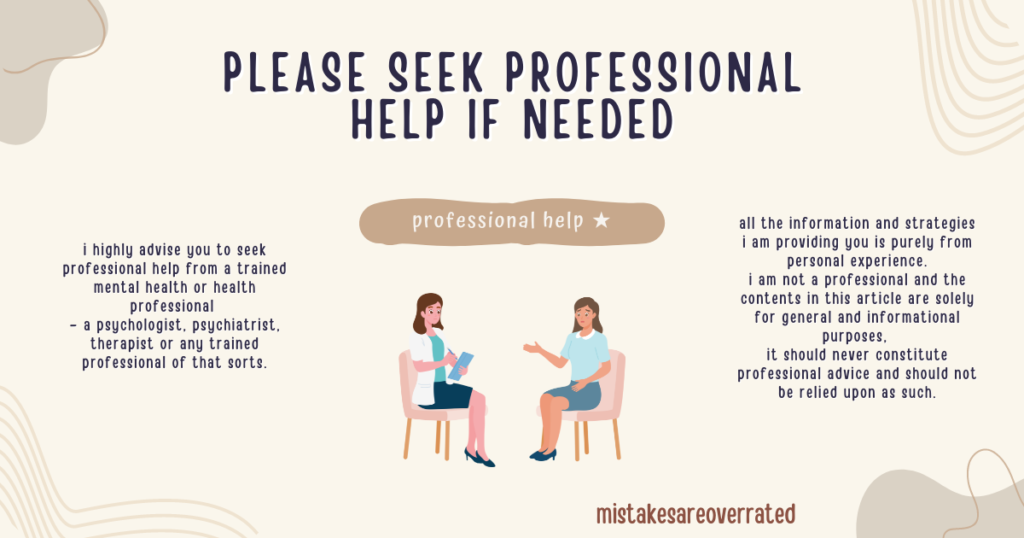*content warning* please be advised this article contains discussion of trauma, triggers and recommendation of deep internal work that may bring up some buried emotions and memories. please read at your own discretion.
trauma, whether from past experience/s, or ongoing experience/s and stress, can profoundly affect our emotional, physical and mental, wellbeing.
after trauma our sleep can become disrupted which is challenging for us but a common response.
our mind tends to think about our trauma in attempt to process and make sense of the traumatic memories.
many people with trauma face this difficulty, myself included for years, so you’re not alone.
with consistency, time and effort, it’s possible to retrain our minds to quiet itself before sleep, allowing us to rest and heal.
how to quiet your mind before sleep
to get our minds to quiet down before sleep, i have found it requires the combination of our emotional, physical and mental states of our body.
please note; it took me almost 2 years to be able to consistently quieten my brain before sleep, and i still occasionally struggle with it.
please know that it won’t be a quick fix, it takes time – and what worked for me may not work for you.
(i researched for many months and some techniques i attempted actually had the opposite affect on me. to find what works best for you, you’re going to have to do trial and error).
here are strategies that can help you relax before falling asleep:

create a bedtime routine
a consistent routine before you sleep can help you wind down, as your brain learns the steps you take to prepare you for sleep.
this routine will be completely personal to you but for inspiration, it may include activities like
reading, journaling, taking a warm shower, relaxation or mindfulness exercises, skin care routine, or listening to calming music.
i avoid engaging in intense conversations before bed as that is when my mind tends to overthink the most.
i found this out through trial and error, so i recommend you trying out different strategies until you find what works best for you.
gratitude
creating a gratitude habit did wonders in my life, state of mind and helping me heal from my trauma.
you can have a gratitude journal you write in before bed, a jar that you put pieces of paper in, a deck of gratitude cards, or just thinking them aloud.
i have an in-depth article going over how gratitude can be powerful in trauma healing, if this is something you’re interested in.
reading
i suggest you have a warm, dim side light to use whilst you read before bed – even better if it can be turned on and off from your bed.
you can read whatever novels or books you like to read that will help calm your mind before you sleep, or you can learn about trauma to understand.
in my personal experience, i can only read books or articles providing information about trauma during the day,
for the first few months after my experience, i researched every night and got into a rabbit hole of reading and learning, so this made me stay awake for 2 hours past my initial bed time.
but i do highly suggest learning about the struggles you face from trauma to help you understand it better and find ways to help you heal.
– you can see if any topics resonate with you here.
deep breathing and meditation
deep breathing exercises activate the part of our body responsible for relaxation.
this ultimately helps calm our body and mind.
guided mediation, box breathing (inhale 1,2,3,4, hold 1,2,3,4, exhale 1,2,3,4, and hold again 1,2,3,4), progressive muscle relaxation (tensing and relaxing certain muscle groups) can all help reduce tension within and promote a state of relaxation.
journaling
writing down your thoughts, feeling and emotions is an expressive mechanism that can help release unwanted thoughts.
keep a journal next to your bed so you can write about your day, reflect on your feelings and emotions, or express any worries, fears or anxieties.
this externalises your emotions instead of suppressing them, so this may ease the pressure or overthinking in your mind.
again, this didn’t help me personally but i suggested it to one of my friends and it helped her alot, so i thought i’d add it in here.
however, i journal every day and the benefits i found are profound, i just can’t do it before bed because my brain thinks about it as i fall asleep.
i have 10 free downloadable journal prompts for trauma healing straight from my journal and now to yours.
visualisation
you can try visualisation techniques or guided imagery that helps you focus on peaceful, quiet and calming scenes.
try to engage all of your senses in this visualisation – hear the sounds, feel the environment, and smell the scents present in your imagery.
this can create a safe space within your mind to help shift your focus away from your distressing thoughts.
this is also extremlyyy powerful in manifestation, as your mind can’t quite differentiate real and imaginary experiences.
so imagine the most powerful version of yourself, the things that bring you joy, the people you love, the places you feel safest.
sleep hygiene
this goes with keeping a regular bedtime schedule, but shower, brush your teeth, wash your face, a nice set of pjs laid out, clean sheets if possible
– just create that little extra comfort and cleanness before going to bed.
also try to limit or avoid caffeine, screen time and alcohol before bed.
creating a comfortable sleep environment
you should try to create your bedroom into a safe and comfortable place for you to sleep in.
i recommend it being cool, quiet, dark if possible, and have comfortable sheets.
during winter i used an electric blanket to keep warm but i found i couldn’t fall asleep for hours due to being warm, so find what works for you.
you may fall asleep best in the cold or warm, just find what makes you comfortable.

avoid overthinking in bed
if you can’t sleep, and this is more than likely to happen as you’re reading this article now, try getting out of bed and doing something relaxing.
it could be reading on the sofa, listening to music, taking a shower, mediation or gentle, calming stretches.
i found actually getting out of my bed helped my body more than just aimlessly lying in bed for hours.
when you find yourself overthinking, try not to dwell or fixate on them.
instead try to either come up with strategies to overcome this thoughts or problem, talk positively to yourself or try to redirect your focus.
practice grounding yourself
grounding techniques can help you stay connected to yourself and the present time.
i found grounding also comes in handy with coping with intrusive thoughts, as you’re allowing your brain to focus on something else.
this will be personal to you as what grounds me may not ground you, but you could try
controlled breathing, using your other senses to identify things, muscle relaxation, body scan meditation, grounding objects (teddy, weighted blanket), ect.
one of the things that i have done to help me sleep since i can remember is saying a mantra “sweet dreams” very softly in my head.
engage in mindfulness
mindfulness can be extremely useful when you’re struggling to sleep.
again you can try relaxation exercises, guided sleep meditation, or mindful thinking.
at first when i was learning how to help my sleeping problems after experiencing trauma, i would listen to sleep mediation music.
reach out and talk to someone
you can reach out to a trusted friend or family member to talk to if you’re struggling.

i highly advise you to seek professional help from a trained mental health or health professional – a psychologist, psychiatrist, therapist or any trained professional of that sorts.
all of the information and strategies i am providing you with today is purely from personal experience.
i am not a professional and the contents in this article are solely for general and informational purposes, it should never constitute professional advice and should not be relied upon as such.
your self care and compassion
self compassion is a must whilst healing from any type of trauma.
find ways or things you can do that comfort yourself, so you can engage in them during these hard times.
also please don’t blame yourself or hold any judgement about yourself.
we need to know we’re there for ourself and have our back through these hard times.
i know self doubt, negative talk and self critic can be very hard to get rid of, but consistently engaging in self compassion and positive self talk, you can become your best friend.
if you struggle to think of ways to calm yourself in the moment of hard times, then you can keep a self care list.
i compiled a list of things that bring me happiness, help me relax and what i love.
this way you can look at the list and choose what will help you the most in this time of need and you can engage in the activity.
what to do if you begin to think about your trauma
sometimes even with the best preparation, our intrusive thoughts can still arise.
if you find yourself thinking about your trauma as you try to fall asleep, these approaches may help.
acknowledgement without judgment
rather than feeling frustrated and trying to fight the thought, just acknowledge it with compassion.
you can speak to yourself kindly and gently redirect your focus to some of the strategies above (calming imagery, breathing techniques, ect)
positive and compassionate self talk helped me profusely during the restless nights.
i used to say “why can’t my stupid brain just turn off and let me sleep”
now i say “i have experienced a lot and this is a painful memory, but i am here and i am safe.”
mindset switch
mindset switch is something i will never stop preaching because of the benefits i experienced from it whilst on my healing journey.
if your traumatic memory/memories resurface, try to reframe it – i like to call it mindset switch.
instead of solely focusing on the emotional pain experienced, remind yourself of the resilience you’ve shown and the aspects you have grown in.
our brains are literally wired to think the worst, so it is not your fault.
with consistency, time and effort, your negative thoughts can be switched with more positive thoughts
– at first with consciously switching them, but within time you will find yourself unconsciously switching them.
try to recognise that you are actively working towards healing, that is a huge accomplishment and you should be proud of yourself.
affirmations or mantras
positive affirmations have become such a key aspect of my life and i hope you will begin to use them in your journey too.
calming mantras or affirmations are small, positive and uplifting phrases that can help shift your focus away from negative thoughts.
repeating phrases like “i am safe”, “i am trying my best”, “i am in control”, can help soothe your mind and reinforce a sense of safety before you sleep.
affirmations are personal to you as you need to believe wholeheartedly in what you’re saying.
even if you don’t believe it at first (i sure didn’t), saying them on a daily basis can help you believe what you’re saying to yourself.
mao’s has a downloadable affirmations page if you would like to save any straight to your device (just hold image down and press save).
grounding techniques
again, engaging in grounding exercises can be a profound technique with helping you reconnect with the present moment.
thinking about our trauma can feel so realistic at times that we feel we are actually reliving the experience/s over again.
find a grounding technique that helps you the most,
for me it was 3-3-3. where i named and focused on 3 things i can see, 3 things i can feel and 3 things i can hear.
this helped as i was redirecting my attention to my present surroundings.
i understand how hard these times are, and it isn’t fair we go through these things,
but you should be so proud of yourself for learning how you can help heal and deal with the affects trauma has on us.
traumas and sleep
trauma can deeply impact our sleep, but we can help quiet our minds with self compassion, effort and intentionally finding the right strategies that work best in our journey.
therapy or seeing a trained professional can help you process your trauma and help you find ways to deal with the effects trauma has on us.
please remember that healing takes time, it’s easy to lose track of our progress, so make sure every once in a while you reflect on how far you’ve come.
-MAO
don’t give trauma the power to control you, you deserve to live how you want. take control of your trauma.
-life advice from one survivor to another
reaching out
this is a safe space.
if you have any questions, or want to let something off your chest, feel free to message.
you are amazing 🤍

Leave a Reply